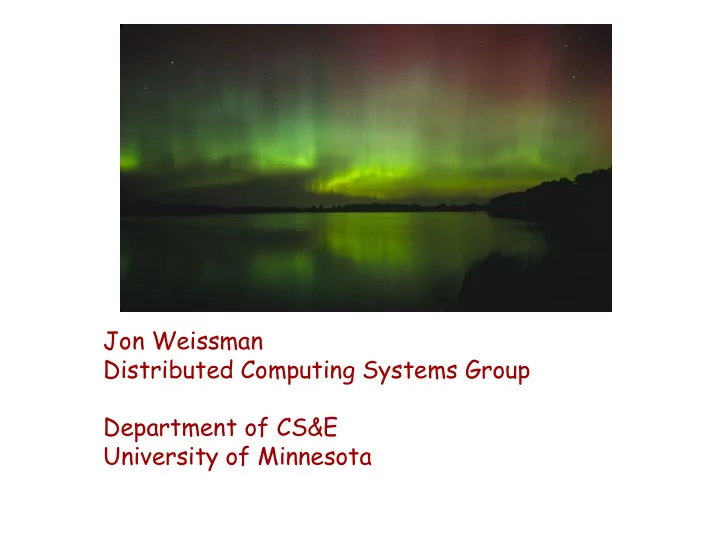

Scheduling in the Cloud Jon Weissman Distributed Computing Systems Group Department of CS&E University of Minnesota
Introduction • “Cloud” Context – fertile platform for scheduling research – re-think old problems in new context • Two scheduling problems – mobile applications across the cloud – multi-domain MapReduce
The “Standard” Cloud Computation Data Results in out “No limits” § Storage § Computing
Multiple Data Centers Virtual Containers
Cloud Evolution => Scheduling • Client technology – devices: smart phones, ipods, tablets, sensors • Big data – 4th paradigm for scientific inquiry • Multiple DCs/clouds – global services • Science clouds – explicit support for scientific applications • Economics – power and cooling “green clouds”
Our Focus • Power at the edge Nebula – local clouds, ad-hoc clouds • Cloud-2-Cloud Proxy – multiple clouds • Big data DMapReduce – locality, in-situ • Mobile user Mobile cloud – user-centric cloud
Mobility Trend: Mobile Cloud • Mobile users/applications: phones, tablets – resource limited: power, CPU, memory – applications are becoming sophisticated • Improve mobile user experience – performance, reliability, fidelity – tap into the cloud based on current resource state, preferences, interests => user-centric cloud processing
Cloud Mobile Opportunity • Dynamic outsourcing – move computation, data to the cloud dynamically • User context – exploit user behavior to pre-fetch, pre-compute, cache
Application Partitioning • Outsourcing model – local data capture + cloud processing – images/video, speech, digital design, aug. reality Server Server Server Server Server …. cloud end Code Proxy Outsourcing repository mobile end Client …. Application Outsourcing Profiler Controller
Application Model: Coarse- Grain Dataflow for i=0 to NumImagePairs a = ImEnhance.sharpen (setA[i], ...); b = ImAdjust.autotrim (setB[i], ...); c = ImSizing.distill (a, resolution); d = ImChange.crop (b, dimensions); e = ImJoin.stitch (c, d, ...); URL.upload (www.flickr.com, ...., e); end-for
Scheduling Setup • Components i, j , … • Aij - amt of data flow between components i and j • Platforms α, β, γ, ... ( mobile, cloud, server, …) • D α, i. type – execute time, power consumed for i running on α • Link αβ, k. type – transmit time, power consumed for kth link between αβ • All assumed to be w/r Input I • On-line runtime measurement based on prior
12 Experimental Results -Image Sharpening Avg. Time • Response time – both WIFI & 3G – up to 27× speedup – 219K, WIFI • Power consumption – save up to 9× times – 219K, WIFI Avg. Power
13 Experimental Results-Face Detection Avg. Time • Face Detection – identify faces in an image • Tradeoffs – power, response • User specifies tradeoffs Avg. Power
Big Data Trend: MapReduce • Large-Scale Data Processing – Want to use 1000s of CPUs on TBs of data • MapReduce provides – Automatic parallelization & distribution – Fault tolerance • User supplies two functions: – map – reduce
Inside MapReduce • MapReduce cluster – set of nodes N that run MapReduce job – specify number of mappers, reducers, <= N – master-worker paradigm • Data set is first injected into DFS • Data set is chunked (64 MB), replicated three times to the local disks of machines • Master scheduler tries to run map jobs and reduce jobs on workers near the data
MapReduce Workflow DFS push shuffle
Big Data Trend: Distribution • Big data is distributed – earth science: weather data, seismic data – life science: GenBank, NCI BLAST, PubMed – health science: GoogleEarth + CDC pandemic data – web 2.0: user multimedia blogs DFS push
Context: Widely distributed data Data in different data-centers Run MapReduce across them Data-flow spanning wide-area networks
Data Scheduling: Wide-Area MapReduce Local MapReduce ( LMR ) Global MapReduce ( GMR ) Distributed MapReduce ( DMR )
PlanetLab Amazon EC-2 DMR is a great idea if output << input LMR and GMR are better in other settings
Intelligent Data Placement • HDFS – local cluster, nearby rack, random rack Application static or Resource Topology Characteristics observed /DCi/rackA/nodeX ????? Data placement Scheduling LMR, DMR, GMR
Problem: Data Scheduling • Data movement is dominant • Data sets located in domains, size: Di, … Dm • Platform domains: Pj, … Pk • Inter-platform bandwidth: BDiPj • Data expansion factors – input->intermediate, α – Intermediate->output, β => select LMR, DMR, GMR
Summary • Cloud Evolution – mobile users, big data, multiple clouds/data centers – many scheduling challenges • Cloud Opportunities – new context for old problems – application partitioning (mobile/cloud) – data scheduling (wide-area MapReduce)
Recommend
More recommend